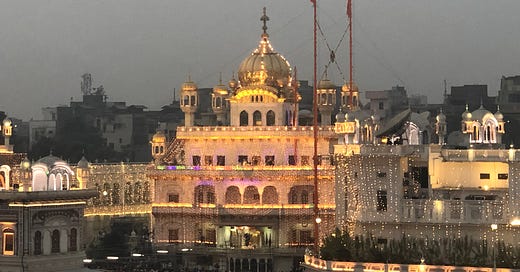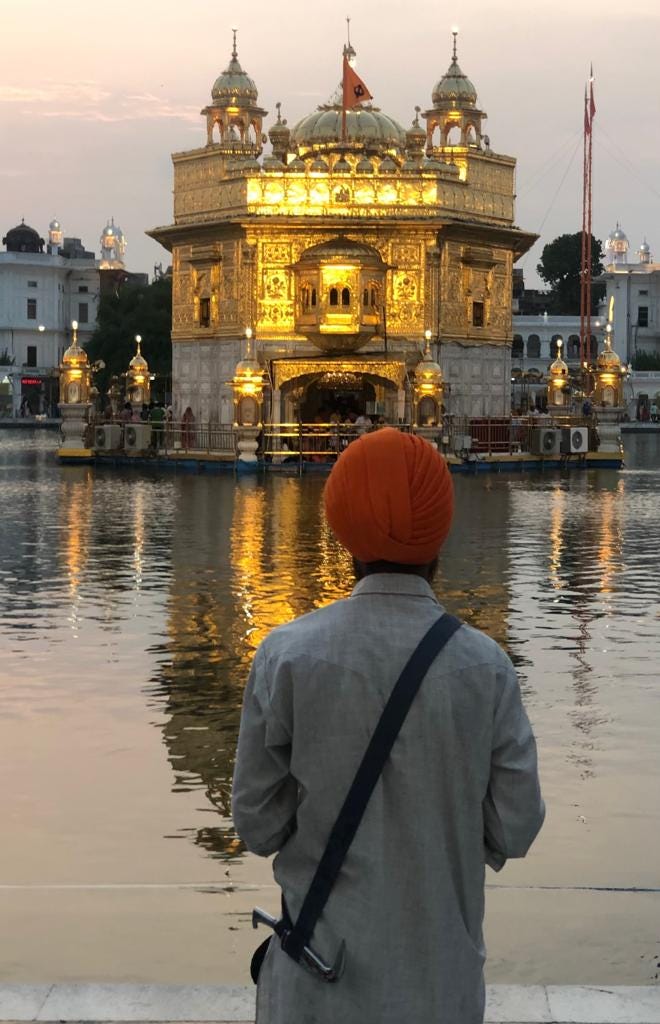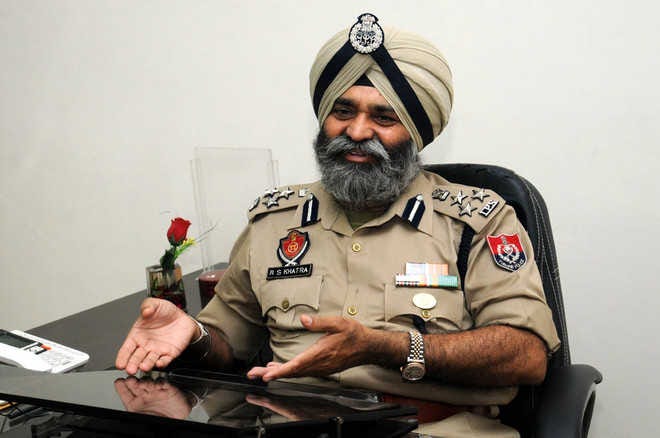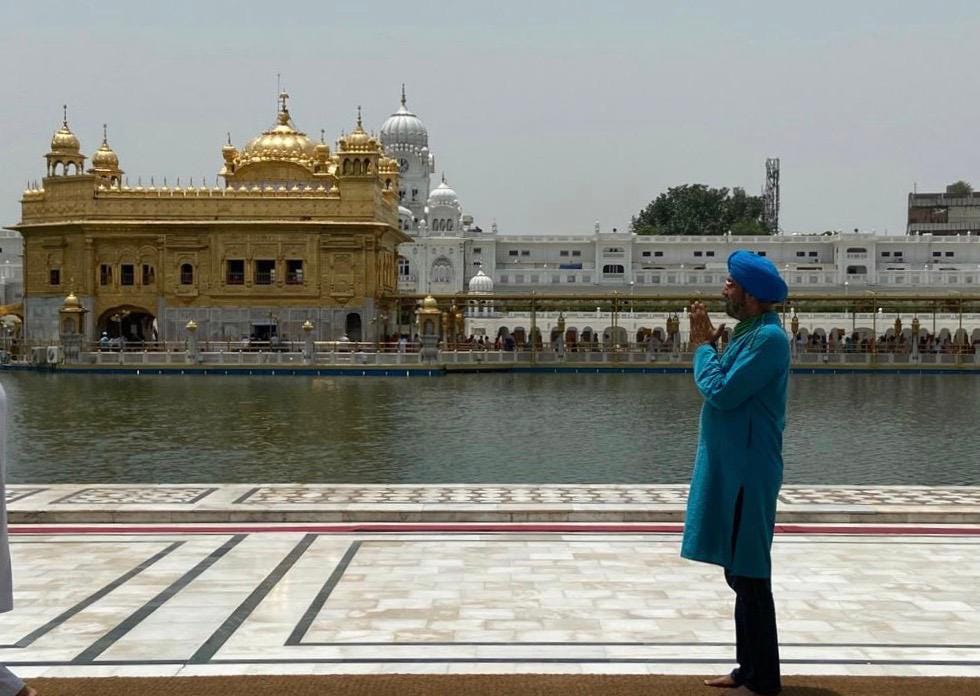Unfolding Proceedings at the Akal Takht: A Critical Juncture for Sikh Leadership
A Reverse Chronology of Events and Detailed Analysis of Stakeholder Actions Required, including by Punjab Government, Amidst Sikh Leadership Crisis.
Unfolding Proceedings at the Akal Takht Sahib
Even as the Jathedar of Akal Takht summoned Sukhbir Singh Badal, President of the Shiromani Akali Dal (SAD), to respond to allegations made by rebel Akali leaders, a dramatic twist unfolded with former Inspector General of Punjab Police, Ranbir Singh Khatra, stepping forward. Appearing suo moto before the Jathedar, Khatra, a retired Punjab cadre IPS officer, presented a detailed chronology and analysis of interconnected events, challenging not only SAD but also the Shiromani Gurdwara Parbandhak Committee (SGPC) and the Punjab Government to respond. This incident marks a crucial point of reckoning within the Sikh political landscape, which is already under intense scrutiny. Allegations, confessions, legal inquiries, and criminal investigations involving senior Akali leaders and key Sikh institutions raise serious questions about governance, justice, ethical leadership, and criminal responsibility.
This analysis delves into the events underscored by Khatra's revelations, examines the implications of the apologies issued by rebel Akali leaders, and explores the necessary actions from key stakeholders—including the Jathedar of Akal Takht and the Punjab Government—to restore confidence and public trust, and to bring the process of justice to a conclusive end.
Ranbir Singh Khatra’s Revelations and Institutional Accountability
a.) Critical Allegations by Ranbir Singh Khatra
Ranbir Singh Khatra, a former Inspector General of Punjab Police, recently presented serious accusations against the Shiromani Akali Dal (SAD) and the Shiromani Gurdwara Parbandhak Committee (SGPC) at a one-on-one meeting with the Jathedar of the Akal Takht. Khatra, a retired IPS officer of known competence and integrity, highlighted the inaction of these apex Sikh institutions in addressing the individuals named in the Justice Ranjit Singh Commission report regarding the Bargari sacrilege cases. He questioned the sincerity of SAD and SGPC in their commitment to justice, suggesting that their lack of action might indicate a protective stance towards the accused, rather than ensuring they face the legal consequences. This critical viewpoint raises concerns about a potential failure in leadership and governance within these organizations, accentuating the need for accountability and transparency in their working.
b.) Call for Action from the Akal Takht
During his discussion with the Akal Takht Jathedar, Khatra reportedly urged the Jathedar Akal Takht to direct SAD and SGPC to adopt a definitive stance on administering justice to those responsible for the sacrilege incidents. He stressed that it is the moral responsibility of these bodies to act decisively and ensure that justice is delivered, in due process of law. Khatra expressed his concern over the eroding trust within the Sikh community towards these institutions, attributed to their apparent reluctance to address and resolve the sacrilege issues effectively. His appeal to the Akal Takht was not only a call for justice but also a plea for restoring faith in Sikh leadership and governance, emphasizing the urgency of addressing the disillusionment among Sikhs seeking closure and accountability for the wrongs committed.
Reverse Chronology of Events
Let us loop back into the recent developments and then recapitulate the unfortunate events of 2015 to 2016, from multiple perspectives.
a.) Apologies from Rebel Akali Leaders: Acknowledgement of Past Errors
On July 1, 2024, rebel leaders of the Shiromani Akali Dal (SAD) regretted their past actions by presenting a joint written apology to the Jathedar of the Akal Takht, Giani Raghbir Singh. This moment of contrition centered around a formal letter which acknowledged several grave missteps during their coalition tenure with the BJP from 2007 to 2017. The apology specifically highlighted four major errors: the failure to adequately respond to the 2015 sacrilege incidents, the controversial pardon of Dera Sacha Sauda chief Gurmeet Ram Rahim Singh in a 2007 blasphemy case, the appointment of the contentious IPS officer Sumedh Singh Saini as Punjab DGP, and the omission to establish a commission to investigate alleged fake police encounters. These lapses, as admitted by the rebel leaders, significantly contributed to the disillusionment within the Sikh community and eroded the political and religious stature of the Akali Dal, pinpointing a critical need for the party to introspect and realign its principles with the expectations and values of its constituency. The leaders directly implicated SAD Chief Sukhbir Singh Badal, the then Deputy Chief Minister, also holding the Home Department portfolio, for these oversights, highlighting a pivotal shift towards accountability and the restoration of trust and integrity within the party and its leadership.
b.) Akal Takht's Directive to Sukhbir Singh Badal
On July 15, 2024, in a significant move, Akal Takht Jathedar Giani Raghbir Singh summoned Sukhbir Singh Badal, President of the Shiromani Akali Dal (SAD), to appear in person, within 15 days, at the Akal Takht. This directive was issued following the aforesaid allegations from rebel SAD leaders questioning Badal's representation of Sikh community sentiments during his tenure. Additionally, the Akal Takht called for clarification from the Shiromani Gurdwara Parbandhak Committee (SGPC) concerning the alleged expenditure of Rs 90 lakh on advertisements, highlighting a demand for transparency and accountability within key Sikh institutions. Responding to the summons, Badal expressed his intention to appear as a devout and humble Sikh, committing to provide a written explanation by the stipulated deadline of July 21, 2024. These developments mark a pivotal moment, reflecting the Akal Takht's active role in enforcing ethical governance and addressing the concerns raised by Sikh community members and leaders alike.
c.) Legal Challenges in the Kotkapura Firing Case
Earlier, in April 2021, the Punjab and Haryana High Court had quashed the chargesheet filed by the then Special Investigation Team (SIT) member, Kunwar Vijay Pratap Singh, IPS in relation to the Kotkapura firing case. This decision led Singh, who subsequently became an AAP MLA from Amritsar North, to take premature retirement from the police force. Dissatisfied with the High Court's ruling, Singh mounted a personal legal challenge, drafting a detailed 1,100-page petition against the quashing of his investigation. This LPA (Letters Patent Appeal), filed through his counsel, brought the case back into the judicial spotlight as the High Court issued a notice to Punjab and other involved parties, scheduling a hearing for December 7, 2021. This legal contestation underscores the complexity and contentious nature of the case, which, while linked, remains separate from the broader Bargari sacrilege incidents and the Kotkapura and Behbal Kalan police firing case.
Renewed Investigation into the Kotkapura Firing Case
a.) Formation a New SIT and its Chargesheets
Following the quashing of the aforementioned initial chargesheet by the Punjab and Haryana High Court in April 2021, a reconstituted Special Investigation Team (SIT) led by ADGP LK Yadav took over the Kotkapura firing case. This new SIT has been proactive, filing several extensive chargesheets that shed light on the alleged involvement of high-profile figures. On February 24, 2023, the SIT filed a 7,000-page main chargesheet that named and implicated prominent politicians and police officers. formally as accused. This was followed by a supplementary 2,400-page chargesheet on April 25, 2023, and another detailed 2,502-page document on August 28, 2023.
b.) Accusations and Legal Proceedings
The chargesheets filed have named significant political and police figures, including the now deceased Parkash Singh Badal, former Chief Minister of Punjab, and Sukhbir Singh Badal, former Deputy Chief Minister and Chief of SAD. High-ranking officers like Sumedh Singh Saini, former DGP, and Paramraj Singh Umranangal, a recently reinstated suspended Inspector General of Police, are also among those implicated. These individuals face serious allegations under various sections of the Indian Penal Code (IPC), such as Section 307 (attempt to murder), Section 153 (wantonly giving provocation with intent to cause riot), Section 109 (abetment), Section 34 (acts done by several persons in furtherance of common intention), Section 201 (causing disappearance of evidence of offence), Section 218 (public servant framing incorrect record), Section 332 (voluntarily causing hurt to deter public servant from his duty), and Section 120B (criminal conspiracy). These charges, which include the above-mentioned accusations of attempt to murder, provocation to cause riot, abetment, and criminal conspiracy, are further bolstered by relevant sections of the Arms Act. The Punjab Home Department has authorized the prosecution under Section 197 of the Code of Criminal Procedure (CrPC), thus setting the stage for an extensive legal review, and potentially a trial, in respect of these serious charges.
c.) Current Status of the Criminal Trial and Implications
The trial court proceedings are still active, but the charges have yet to be formally framed, underscoring the complexity and ongoing nature of this high-stakes investigation. The series of chargesheets produced by the Yadav-led SIT marks a critical step toward addressing past grievances and ensuring accountability at the highest levels of power in Punjab. The detailed documentation and persistent legal efforts highlight the importance of transparency and due process in resolving cases with profound political and social ramifications. However, the fact that charges have not yet been formally framed by the judicial court indicates that the actual trial has not commenced. This delay calls for a more proactive approach from the public prosecutors of the Punjab government to expedite the trial process.
Detailed Actions Required by Key Stakeholders
In light of the ongoing complexities and the escalating situation, it is imperative that all major stakeholders involved act responsibly to ensure that anyone responsible, accountable, or culpable is called upon to account for their actions, whether these are acts of omission or commission, deliberate or inadvertent. Merely shifting blame among key players would be a profound disrespect to Sri Guru Granth Sahib, essentially allowing perpetrators and their silent accomplices to evade justice. This would not only result in a gross injustice but would also perpetuate the grievances felt by the broader Punjabi community, particularly the Sikh community. It is crucial that each organisation or office-bearer steps up, taking definitive actions that contribute to rectifying past wrongs and restoring faith in the institutions meant to safeguard their interests and uphold their values.
A.) Action Plan for the Punjab Government
Expedite Pending Investigations: Any ongoing investigations should be concluded swiftly to maintain the integrity and momentum of the judicial process. Every FIR should either lead to a chargesheet or recommend a discharge order by the jurisdictional judicial court.
Appointment of a Special Public Prosecutor: Given the complexity and importance of the cases, a Special Public Prosecutor should be appointed. This role should be filled by a senior advocate with a full-time commitment to ensure undivided attention to the cases, rather than relying on district attorneys or public prosecutors who are often overburdened in many other cases.
Establishment of a Special Court: Request the Punjab and Haryana High Court to establish a Special Court of the rank of an Additional Sessions Judge specifically for trying the Kotkapora firing case and other similar or related matters. This court should operate on a day-to-day basis and not be assigned any cases unrelated to these core issues.
Defence of Interim Orders: In the event of any challenges to interim orders through appeals or revision/ writ petitions by the accused or their proxies, the Advocate General of Punjab must be assigned the responsibility to defend these cases diligently and appear at all hearings personally.
Monthly Coordination Meetings: Organize monthly meetings at the level of the Principal Secretary of Home to address any coordination or logistical issues. A single press note summarizing the status and progress over the past month should be issued regularly, to keep the general public informed.
Restriction on Political Statements: The political executive, including ministers and government officials, must refrain from making public statements, tweets, or issuing advertisements that could potentially prejudice the ongoing investigations or trials. This measure is crucial to avoid giving the accused any grounds to claim that the process has been prejudiced or was biased against them.
B.) Action Plan for Shiromani Akali Dal (SAD)
Internal Reassessment and Democratization: SAD should undertake a comprehensive internal review aimed at democratizing its decision-making processes. This review should focus on identifying and eliminating any autocratic tendencies, ensuring the party's governance structure becomes more inclusive and representative of its diverse membership.
Legal Cooperation and Support: The party should actively support and facilitate legal processes related to sacrilege and police firing cases. This includes providing full cooperation to investigating authorities and ensuring that all implicated individuals are given a fair trial, without prejudice.
Addressing Past Mistakes: SAD needs to openly acknowledge and apologize for the errors committed during the SAD-BJP government tenure from 2007 to 2017. Reflecting on these past actions is crucial for rebuilding trust and addressing public disillusionment.
Reform and Distance from Past Accusations: The party should take clear steps to distance itself from past accusations of corruption, dynastic rule, and negligence on key Sikh and Punjab issues. This involves introspecting on reasons behind electoral losses and initiating corrective actions.
Re-engagement with Core Ideology: Reconnect with the party’s core ideology and traditional support base through direct community engagement. This involves integrating grassroots feedback into the party's strategies and policies.
Transparency and Accountability: Advocate for early elections for the General House of the SGPC to enhance transparency and accountability within the organization. This move should aim to refresh the leadership to better reflect current community sentiments.
Non-Interference in SGPC Functions: Ensure that SAD adheres to the provisions enshrined in the Sikh Gurdwaras Act, 1925, which stipulates non-interference in the functioning of the SGPC, allowing it to operate independently and effectively fulfill its responsibilities, under the aforesaid statute.
By implementing these actions, SAD can strive to restore its credibility and secure a more stable and respected position within the political and religious landscape of Punjab.
c.) Strategic Reforms for Shiromani Gurdwara Parbandhak Committee (SGPC)
Non-Interference in Akal Takht Proceedings: SGPC must ensure that it does not interfere, either directly or indirectly, with the processes undertaken by the Jathedar of the Akal Takht. This commitment to non-interference is crucial to uphold the independence and integrity of the Akal Takht's decisions.
Advocacy for Justice: The SGPC should actively support and advocate for the legal processes aimed at bringing justice in the sacrilege cases. This involves facilitating any necessary assistance to ensure that the culprits are prosecuted effectively and fairly.
Autonomy from Shiromani Akali Dal: SGPC must operate independently of the Shiromani Akali Dal and particularly from its President, Sukhbir Singh Badal, or any other political figures. The Committee should reject any informal or formal directives or recommendations from the party and adhere strictly to the provisions of the Sikh Gurdwaras Act, 1925.
Operational Transparency: Enhance transparency within SGPC operations, particularly concerning financial dealings and administrative decisions, and audit of its accounts as laid down under the law of 1925. This will help build trust and ensure accountability within the community.
Educational Outreach: Invest in community education programs that detail the legal and ethical responsibilities of Sikh institutions. This initiative will foster a more informed and engaged community, enhancing participation and oversight of SGPC activities.
Demand for Timely Elections: Push for early elections for the General Body of the SGPC, noting that the last election was held in 2011. The urgency is underscored by the upcoming deadline for voter registration claims, expiring on July 31st. Early elections are vital for refreshing the leadership and aligning it more closely with the current needs and aspirations of the Sikh community.
Implementing these strategies will help the SGPC to function as a robust, transparent, and independent body, aligned with the ethical standards expected by the Sikh community and necessary for its effective governance.
D.) Strategic Leadership Role of the Jathedar Akal Takht
Reassertion of Moral Leadership: The Jathedar of Akal Takht should use recent events as a pivotal opportunity to reaffirm the institution's role in upholding moral and ethical standards across all Sikh institutions. This involves ensuring that these bodies adhere to the highest conduct principles, thereby reinforcing the Akal Takht's role as a cornerstone of Sikh ethical governance.
Independence and Historical Mandate: Despite the Jathedar's appointment under the Sikh Gurdwaras Act, 1925, being made by the Executive Committee of the SGPC, it is crucial for the Jathedar to operate without being overshadowed by this affiliation. The historical context that the Jathedar's role was established by Sri Guru Hargobind Ji, centuries before the creation of the SGPC, underscores a profound responsibility that extends beyond temporal administrative bodies to the spiritual and global Sikh community, guided by the teachings of the Sri Guru Granth Sahib.
Inclusive Consultative Process: The Jathedar should consult with the other Jathedars from the remaining four Takhts, including legal experts and scholars of Sikh history, to possibly achieve a unanimous endorsement before making significant decisions. This inclusive approach not only enhances the decisions' credibility but also aligns them with a collective and representative Sikh perspective.
Facilitating Constructive Dialogue: As a facilitator, the Jathedar should orchestrate dialogues between various stakeholders including the government, SAD, SGPC, and the wider Sikh community. This role is critical in mediating perspectives and ensuring that all views are respectfully considered in the pursuit of justice and communal harmony.
Promoting Community Mobilisation: The Jathedar Akal Takht should actively encourage and call for community-wide involvement in discussions regarding governance and justice. By fostering a participatory approach, the Jathedar can ensure that reforms and decisions are supported by a broad consensus, thereby strengthening their implementation and impact across the Sikh community.
These strategic actions are essential for the Jathedar of Akal Takht to preserve the integrity and independence of this vital religious office and to lead it in a manner that reflects its foundational values and the aspirations of Sikhs worldwide.
Summing Up and Looking for Closure
The Sikh community in Punjab, and indeed globally, stands at the proverbial crossroads, grappling with allegations of misconduct against key leaders and the pressing need for substantial institutional reform. Although the proceedings initiated by the Jathedar of Akal Takht were initially focused essentially on the unity of the SAD as a political party, Ranbir Singh Khatra's suo moto intervention has shifted the spotlight to broader issues, extending beyond the immediate concerns surrounding the fate of a political party like SAD, which saw its vote share plummet to an all-time low of 13.42 percent in the 2024 Lok Sabha elections. The status of the criminal investigations as well as the ongoing trials are back in focus.
The future actions of these stakeholders will be critical in steering the course towards restored integrity and bolstered public confidence, especially among the Sikh community. It is essential that all involved parties act decisively and collaboratively to uphold the principles of justice and ethical governance. The role of each stakeholder is not merely to address the immediate challenges but to establish a precedent for responsible and transparent leadership for the future. The decisions and actions will be closely watched and scrutinized not only by Punjabis in general but also by the global Sikh community, and will be instrumental in defining their legacies as “panthic” leaders for posterity. History has shown that those perceived as betraying the interests of the “panth” for narrow, personal gains are often labeled as traitors (ਗੱਦਾਰ in Punjabi Gurmukhi) by future generations.








ਬੇਮੁਖ ਹੋਏ ਰਾਮ ਤੇ ਲਗਨਿ ਜਨਮ ਵਿਜੋਗ
ਰਾਜ ਸੱਤਾ ਦੇ ਲਾਲਚ ਵਿੱਚ ਸੌਦੇ ਸਾਧ ਨੂੰ ਜ਼ਬਰਦਸਤੀ ਮੁਆਫੀ ਦਿਵਾਉਣ ਤੋਂ ਘਟੀਆ ਕਰਤੂਤਾਂ ਸ਼ੁਰੂ ਹੋਈਆਂ ਫਿਰ ਅੱਗੋਂ ਪਾਪ ਤੇ ਪਾਪ ਕਰਦੇ ਗਏ। ਇਹ ਵੀ ਇੱਕ ਡਰਾਮਾਂ ਹੀ ਹੈ। ਜੇਕਰ ਸਹੀ ਨਿਰਣਾ ਕਰਨਾਂ ਹੈ ਤਾਂ ਗਿਆਨੀ ਗੁਰਮੁੱਖ ਸਿੰਘ ਅਤੇ ਗੁਰਬਚਨ ਸਿੰਘ ਦੇ ਬਿਆਨ ਲਏ ਜਾਣ ਅਤੇ ਮੁੱਢਲੇ ਦੋਸ਼ੀਆਂ ਦੇ ਨਾਲ ਨਾਲ ਅਗਲੀਆਂ ਸਰਕਾਰਾਂ ਦੀਆਂ ਮਿਲੀਆਂ ਭੁਗਤਾਂ ਨੂੰ ਨਸ਼ਰ ਕਰਕੇ ਫੈਸਲਾ ਕਰਨ ਦੀ ਲੋੜ ਹੈ ਨਹੀਂ ਤੇ ਇਹ ਮਸਲਾ ਹੋਰ ਉਲਝੇਗਾ।
ਸਿੱਧੂ ਸਾਹਿਬ